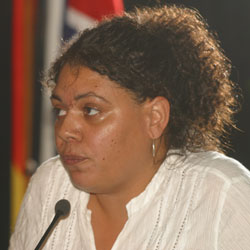
Ms Jean Fenton
The Symposium audience was given a strong message about the need for governments to re-think Indigenous social and economic policy.
Several speakers accused the NT and Federal Government of disempowering Aboriginal people and said they must foster sustainable livelihoods for people on their traditional land.
Dr Rolf Gerritsen, CDU Professional Fellow for Tropical Savannas, and former Director of Social and Economic policy in the Chief Minister’s Office said the NT was in danger of economic decline in the next 50 years.
Dr Gerritsen was critical of the NT Government’s spending on projects like the Waterfront Development and said it needs to invest in industries that develop the existing social capital of the Territory, in particular Indigenous people.
“That system, by incorporating the traditional/communal economy of the region’s Aboriginal people, can provide more positive economic potential than if the current situation continues,” he said.
“If that incorporation does not occur then ecology and social institutions will suffer as the people and communities of northern Australia become less resilient.”
Dr Gerritsen said a potential market existed for traditional Aboriginal knowledge about land management knowledge as well as flora and fauna.
He said rather than relying on transient labour, enterprises like the cattle industry should be looking to young Indigenous men, who know the land and are likely to stay because of the connection with Country.
Joe Morrison and Jean Fenton from the North Australian Indigenous Land and Sea Management Alliance (NAILSA) continued the theme of developing a culture-based economy in their presentations.
Mr Morrison said fostering traditional and non-traditional Indigenous business opportunities for example mining, the arts and the provision of environmental services would help to counteract widespread social dysfunction.
“We need to support the occupation of country by Indigenous people as an economic positive,” he said.
Ms Fenton, also from NAILSA, said an excellent opportunity to develop the commercial use of wildlife for Indigenous people through regulated crocodile hunting safaris had been “hijacked by emotional debate”.
She said the Federal Government’s decision to stop this industry from going ahead based on a strong animal rights lobby was helping to perpetuate the cycle of poverty facing Indigenous communities.
“At present, about 600 crocodiles are culled each year. Senator Ian Campbell cited the fact that crocodiles are an ‘iconic species’. So Aboriginal people think: Are we valued less than an iconic species?” Ms Fenten said.
In his presentation, CDU’s Professor of Tropical Knowledge, Steven Garnett, suggested policy changes are needed to create profitable livelihoods for Indigenous people and raised the concept Indigenous “ownership” of species.
Professor Garnett used the example of bush foods, and said there was currently no protection for Indigenous people in industries derived from wild harvest products on their Country.
In the words of the Symposium Chair, former ABC journalist Justin Murphy: “The initial discussion is out there and debate rages. The more frustration there is the more the discussion will go on.”